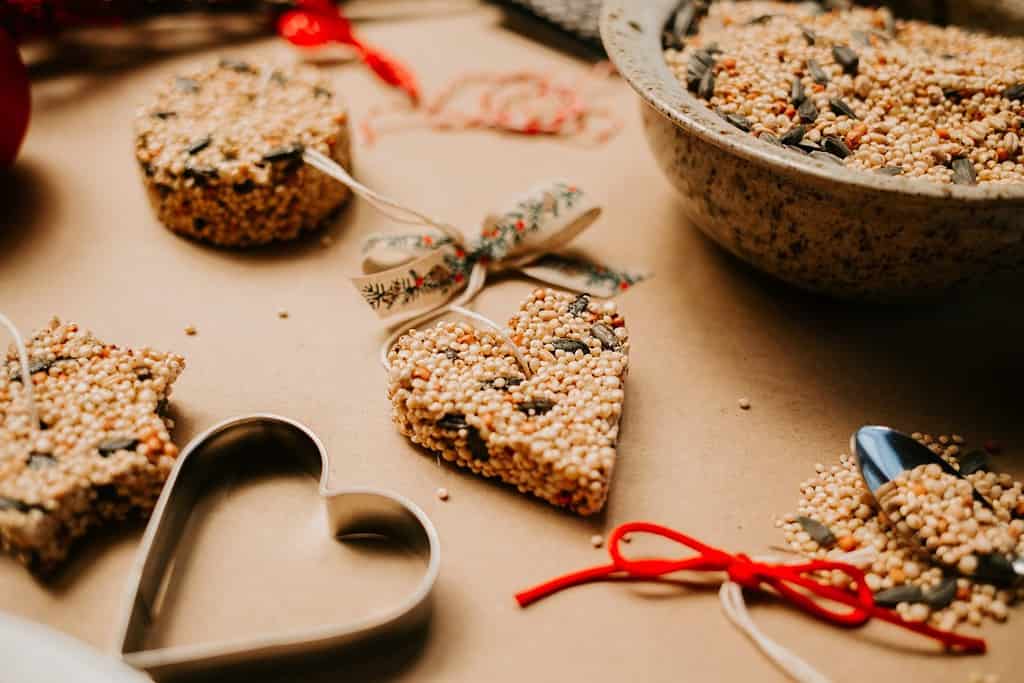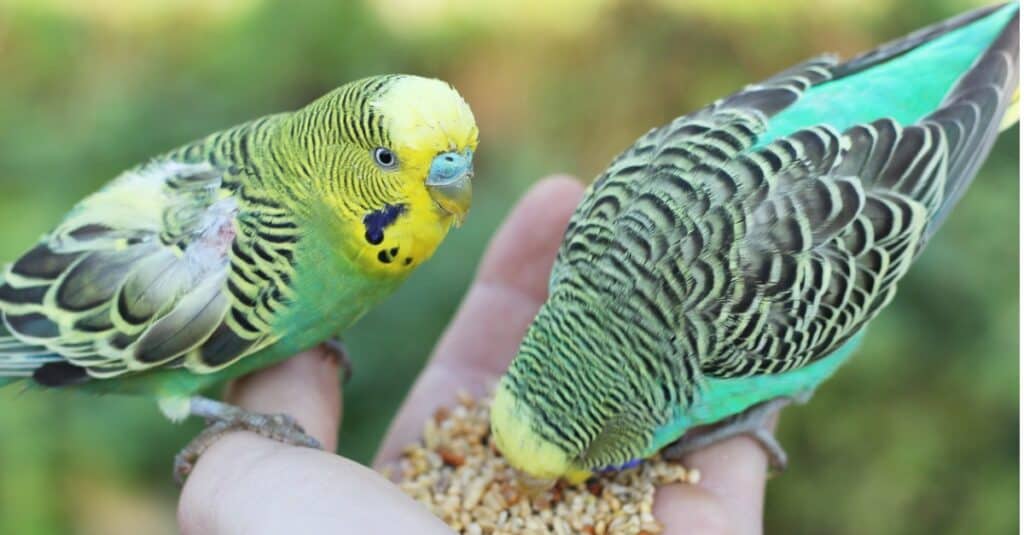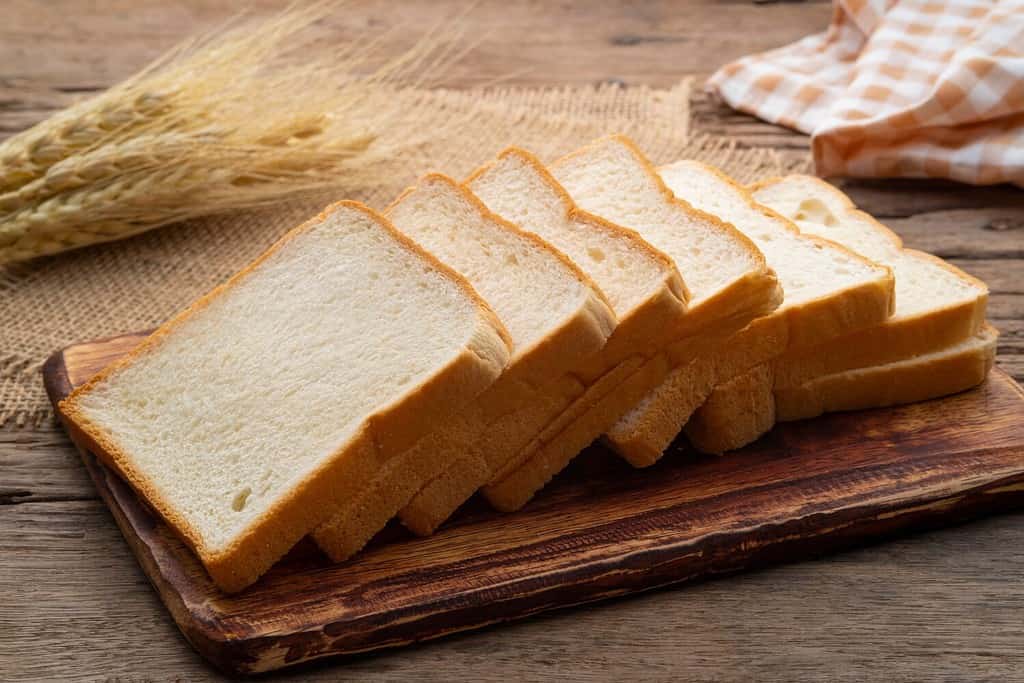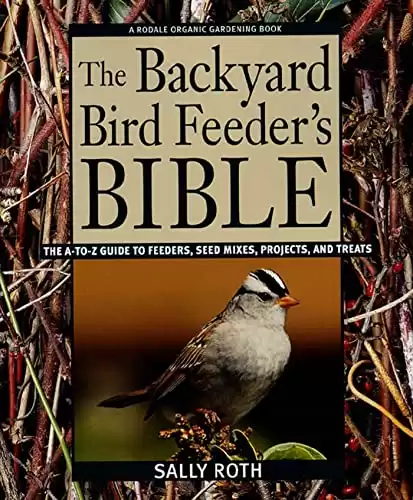
There are all sorts of creative ways to give out healthy birdseed and bird food to your local wildlife.
©Megan Betteridge/Shutterstock.com
There are plenty of bird seeds and bird food out there on the market for wild birds. However, not all of them are equally good. Fillers and foods once thought to be great for birds are not only hurting your wallet but can end up injuring the very same birds you want to help. If you want to be the perfect backyard bird feeder, you also need to consider changing your bird feed based on season and location.
To learn more about the details of birdseed and bird food to give and not to give wild birds, as well as how to feed the birds in your area, continue reading below.
Nutrition Requirements Change per Season
As seasons change, birds need a different mix of birdseed and bird food. While you can serve seeds and seed mixes throughout the whole year, it’s not the best option to help birds get the nutrients they need.
Spring
In the spring, birds don’t need a lot of help from people. This is the time when most birds are working on building nests and taking care of their young. You may think you’re helping them out by putting out seeds, but in reality, most birds feed their young insects.
If you’re a little squeamish about insects, don’t worry. You don’t have to go and collect insects to give to local birds. They’re more than capable of finding them on their own, and often better at it than you are.
If you want to help birds in the spring, there are a few options. The most important is to reduce the number of insecticides you’re using. Not only does this give birds plenty of options to find insects, but it ensures they don’t get injured by the chemicals the insects get into.
When you use eggs, don’t toss out the eggshells. Wash, rinse, and break them up before sprinkling them outside. Birds will eat eggshells because they’re high in calcium, which is what they need to make new, sturdy shells. You can also help by setting out twigs, string, and other items that birds commonly use to make nests.
Of course, all of this isn’t to say that you shouldn’t leave out any seeds. Having a bird feeder out does help the parent birds get the nutrients they need, and it helps birds that might not have babies that season.
Summer
You might think summer is the perfect time to feed birds, but that’s not necessarily true. In summer, there is plenty of natural food for birds to eat, so they don’t necessarily need bird feeders.
If you want to feed the birds, a simple birdseed mix is plenty. However, make sure that you are changing the seeds often. If the seeds get wet, they can mold, which actually hurts the birds more than helps them.
Summer is the perfect time to feed hummingbirds though. With a little hummingbird feeder and sugar water, you’ll be able to see some gorgeous little birds and ensure they get plenty of food. Like with birdseed, you want to change out sugar water every couple of days to prevent molding or the growth of bacteria that can seriously harm hummingbirds.
Fall
Fall is when natural food sources start growing scarce for birds. In more southern areas where it stays warm in fall and winter, you’re likely to see more birds around this time. Even in areas where it gets pretty cold, there will be some birds that don’t migrate.
If you want to help the birds that are sticking around, it’s best to pick fattier foods. Feel free to go and get a regular bag of birdseed. However, consider adding a few extra items in the mix, like peanuts, and millet. This is also the perfect time to put out suet feeders.
Winter
Winter is about the same as fall. If you want, increase the number of peanuts and millet in the mix. It’s also the perfect time to put out pinecones covered in peanut butter and seeds. Cracked corn and fatty seeds like sunflower seeds are also a great addition to any standard birdseed mix.
Best Seed Mixes
While seed mixes are a great option that’s low budget and doesn’t take up a lot of your time, you don’t want to get any old birdseed. It’s important to get seed mixes that have a good blend of nutrients.
Additionally, every bird likes something a little different, so you want to consider getting bird seeds specific to the birds in your area. If you’re not great at identifying birds, there are options for birdseed based on states or areas as well, as long as you’re willing to do a little research.
- A bag of bird feed for wild birds.
- This specific blend attracts cardinals, chickadees, and woodpeckers, among others.
- The feed has a cherry aroma.
- Available for sale are three bag sizes of 5, 10, and 20 pounds.
Kaytee is a great brand that is known for providing excellent food mixes for domestic pets. However, it also makes a wonderful birdseed mix for wild birds. It’s got a lot of ingredients that birds like, including dried fruits, fatty nuts, and black oil sunflower seeds.
If you read the ingredients on the birdseed, you’ll notice that there aren’t many fillers. This is good, as it means that less of the birdseed will be wasted. It is made specifically for many birds you’ll find in the wild and that most people want in their garden.
Having birdseed and bird food with fewer fillers and cheap ingredients also means that you’re more likely to only attract the birds you want. Pigeons, grackles, jays, and other birds that tend to push away songbirds usually aren’t as attracted to these birdseed mixes as much as some of the others.
Should You Use Domestic Birdseed for Wild Birds?

While wild birds can eat the same thing as your beloved budgees, it isn’t necessary.
©iStock.com/urafoc
Generally, there’s no harm in providing domestic birdseed mixes for wild birds, except for a dent in your pocket. Most wild birdseed mixes are just seeds. They are made to be used as a supplement to a bird’s normal diet of insects and anything else they eat in the wild.
Domestic birds don’t have the option to go and collect insects, and most owners aren’t keen on trying to feed their domesticated birds bugs they caught in the wild. This means that most bird seeds for pet birds include items that are more nutritionally versatile, including extra protein and a greater diversity of ingredients.
Domestic bird food also has a lot lower fat content, as they aren’t moving around as much as wild birds. If you were to use domestic birdseed for wild birds, you’d likely need to add some fatty ingredients like sunflowers and peanuts to make it something wild birds need a bit more.
In short, while you can feed wild birds domestic bird food, it isn’t necessary and doesn’t have very many benefits except a few fewer filler ingredients. It’s also not recommended you feed domestic birds wild birdseed, as it has too many fats and not enough diversity to provide your domestic birds with all the nutrients they need.
Best Individual Seeds for Birds
If you want to make your own birdseed and bird food, that’s an option too. There are plenty of ideas to help you figure out what’s best to add. Like with birdseed mixes, it’s best to find recipes for birdseed based on the birds you have in your area, or based on your location.
There are a few benefits to making your own seed. For one, you can make sure that there are no fillers. Since fillers don’t provide a lot of nutrients for birds, you are spending money on items that most birds won’t eat. So while a cheap birdseed mix may seem cheaper, it’s only because of cheap ingredients that are only going to get wasted.
- 384 pages.
- Has various tips and tricks on bird feeding.
If you aren’t sure where to start, or you’re very passionate about birds and feeding them, The Backyard Bird Feeder’s Bible is a great book to buy to help you figure out where to get started. It not only covers seeds and bird mixes that are best for birds, but feeders, and little projects that you can do to make your own unique treats for the local birds.
Making Your Own Birdseed and Bird Food Basics
For a simple birdseed mix that doesn’t require a lot of thought, consider creating a mix with some of these ingredients:
- Black oil sunflower seeds
- White proso millet
- Cracked corn
- Sunflower chips
- Striped sunflower seeds
- Peanuts
- Thistle seeds
- Milo (sorghum)
- Safflower seeds (doubles as squirrel and pest bird repellent)
You don’t have to use them all, but a mix of a couple of them provides a variety of nutrients your birds will appreciate. Additionally, if you pay attention to what is and isn’t eaten by your birds, you can adjust the feed as you go to make a mix that’s perfect for local preferences.
There are some ingredients you’ll find in a majority of birdseed mixes that aren’t on the list above. That’s because they are the ones most often not eaten by birds. It’s a waste of money to put them in your birdseed. Also, because they sit around for so long, these ingredients tend to grow bacteria and mold, which is dangerous for birds.
Some items you may not want to include are:
- Golden millet
- Red millet
- Flax
- Canary seeds
- Rapeseed
The last two ingredients on this list are eaten by some birds, but they tend to be more pest birds. If some of the more popular birds do eat them, they also usually eat other seeds, like sunflower seeds, so they are just better to not use overall.
Foods to Avoid Giving Wild Birds

Handing out bread to birds was once a common thing but it should be avoided to provide maximum nutrition to birds.
©Kritchai7752/Shutterstock.com
There are some foods you should avoid ever giving birds. The first to pay attention to is human-grade seeds and nuts, for the most part. If it’s made for people to eat, it generally has a lot of sodium. Even low-sodium versions often have more sodium than birds need. You need to get uncooked and unsalted varieties of seeds and nuts for your wild birds.
On that note, you also want to avoid any salty foods, including your scraps leftover from dinner. Certain spices and herbs, as well as salt and oil, are dangerous for birds. Even if you eat entirely fruits and vegetables, you risk feeding birds food that will make them sick.
Other items are meat, bread, and chocolate. Though birds eat insects, they don’t need actual meat. It can make them sick as it’s too high in protein. For a long time, bread was considered to be a great food to provide to birds. However, it has next to no nutritional value for birds. It also fills them up quickly, which means that they will eat a lot of bread and then not eat anything that provides nutritional benefits. Chocolate is toxic to birds due to the theobromine in it, just like it is for dogs and cats.
The photo featured at the top of this post is © Ssirounarev/Shutterstock.com
Thank you for reading! Have some feedback for us? Contact the AZ Animals editorial team.








